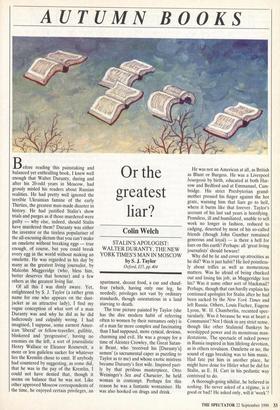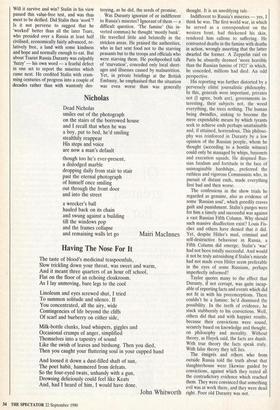AUTUMN BOOKS
Or the greatest liar?
Conn Welch
STALIN'S APOLOGIST: WALTER DURANTY, THE NEW YORK TIMES'S MAN IN MOSCOW by S. J. Taylor
Oxford, £15, pp.404
Before reading this painstaking and balanced yet enthralling book, I knew well enough that Walter Duranty, during and after his 20-odd years in Moscow, had grossly misled his readers about Russian realities. He had pretty well ignored the terrible Ukrainian famine of the early Thirties, the greatest man-made disaster in history. He had justified Stalin's show trials and purges as if those murdered were guilty — why else, indeed, should Stalin have murdered them? Duranty was either the inventor or the tireless populariser of the all-excusing dictum that you can't make an omelette without breaking eggs — true enough, of course, but you could break every egg in the world without making an omelette. He was regarded in his day by many as the greatest living journalist, by Malcolm Muggeridge (who, bless him, better deserves that honour) and a few others as the greatest living liar.
Of all this I was dimly aware. Yet, enlightened by S. J. Taylor (a rather grim name for one who appears on the dust- jacket as an attractive lady), I find my vague conception of what sort of a man Duranty was and why he did as he did ludicrously and culpably wrong. I had imagined, I suppose, some earnest Amer- ican 'liberal' or fellow-traveller, gullible, blinkered and 'progressive', having no enemies on the left, a sort of journalistic Henry Wallace or Eleanor Roosevelt, a more or less guileless sucker for whatever lies the Kremlin chose to emit. If anybody had countered by suggesting, as some did, that he was in the pay of the Kremlin, I could not have denied that, though it seems on balance that he was not. Like other approved Moscow correspondents of the time, he enjoyed certain privileges, an apartment, decent food, a car and chauf- feur (which, having only one leg, he needed); privileges not vast by ordinary standards, though ostentatious in a land starving to death.
The true picture painted by Taylor (she has the dire modern habit of referring often to women by their surnames only) is of a man far more complex and fascinating than I had supposed, more cynical, devious, charming and evil. He was a groupy for a time of Aleister Crowley, the Great Satan- ic Beast, who 'received his [Duranty's] semen' (a sacramental caper as puzzling to Taylor as to me) and whose exotic mistress became Duranty's first wife. Inspired part- ly by that perilous masterpiece, Otto Weininger's Sex and Character, he held woman in contempt. Perhaps for this reason he was a fantastic womaniser. He was also hooked on drugs and drink. He was not an American at all, as British as Blunt or Burgess. He was a Liverpool bourgeois by birth, educated at both Har- row and Bedford and at Emmanuel, Cam- bridge. His strict Presbyterian grand- mother pressed his finger against the hot grate, warning him that liars go to hell, where it burns like that forever. Taylor's account of his last sad years is horrifying. Penniless, ill and humiliated, unable to sell work no longer in fashion, reduced to cadging, deserted by most of his so-called friends (though John Gunther remained generous and loyal) — is there a hell for liars on this earth? Perhaps: all 'great living journalists' should beware!
Why did he lie and cover up atrocities as he did? Was it just habit? He lied pointless- ly about trifles as well as momentous matters. Was he afraid of being chucked out and losing his job, as Muggeridge lost his? Was it some other sort of blackmail? Perhaps, though that can hardly explain his continued apologies for Stalin after he had been sacked by the New York Times and left Russia. Others, Louis Fischer, Eugene Lyons, W. H. Chamberlin, recanted spec- tacularly. Was it because he was at heart a Communist? Not I think in any strict sense, though like other Stalinoid flunkeys he worshipped power and its monstrous man- ifestations. The spectacle of naked power in Russia inspired in him lifelong devotion, as in others revulsion. Omelette or no, the sound of eggs breaking was to him music. Had fate put him in another place, he might have done for Hitler what he did for Stalin, as E. H. Carr in his pedantic way contrived to do.
A thorough-going nihilist, he believed in nothing. He never asked of a regime, is it good or bad? He asked only, will it 'work'? Will it survive and win? Stalin in his view passed this value-free test, and was thus meet to be deified. Did Stalin then 'work'? Is it not perverse to suggest that he 'worked' better than all the later Tsars, who presided over a Russia at least half civilised, economically fairly advanced, re- latively free, a land with some kindness and hope and normally enough to eat. But about Tsarist Russia Duranty was culpably 'fuzzy' — his own word — a fearful defect in one set to report the miseries which came next. He credited Stalin with cram- ming centuries of progress into a couple of decades rather than with wantonly des- troying, as he did, the seeds of promise.
Was Duranty ignorant of or indifferent to Russia's miseries? Ignorant of them — a difficult question. 'The famine' (his in- verted commas) he thought 'mostly bunk'. He travelled little and belatedly in the stricken areas. He praised the authorities, who in fact sent food not to the starving peasants but to the troops and officials who were starving them. He poohpoohed talk of 'starvation', conceded only local short- ages and illnesses caused by malnutrition. Yet, in private briefings at the British Embassy, he emphasised that the situation was even worse than was generally thought. It is an unedifying tale. • Indifferent to Russia's miseries — yes, I think he was. The first world war, in which he served as a correspondent on the western front, had thickened his skin, rendered him callous to suffering. He contrasted deaths in the famine with deaths in action, wrongly asserting that the latter dwarfed the former. A Zeppelin raid on Paris he absurdly deemed 'more horrible than the Russian famine of 1921' in which, he conceded, millions had died. An odd perspective.
His reporting was further distorted by a• perversely elitist journalistic philosophy. In this, generals were important, privates not (I agree, both are), governments in- teresting, their subjects not, the wood everything, the trees nothing. The human being dwindles, sinking to become the mere expendable means by which tyrants seek to achieve ends perhaps unattainable and, if attained, horrendous. This philoso- phy was reinforced in Duranty by a low opinion of the Russian people, whom he thought (according to a hostile witness) could only be managed by whips, bayonets and execution squads. He despised Rus- sian fatalism and fortitude in the face of unimaginable hardships, preferred the ruthless and vigorous Communists who, in pursuit of distant ends, made everything first bad and then worse.
The confessions in the show trials he regarded as genuine, also as evidence of some 'Russian soul', which greedily craves guilt and punishment. Stalin's purges were for him a timely and successful war against a vast Russian Fifth Column. Why should such massive disaffection exist? Louis Fis- cher and others have denied that it did. Yet, despite Hitler's mad, criminal and self-destructive behaviour in Russia, a Fifth Column did emerge; Stalin's 'war' had not been totally successful. And would it not be truly astonishing if Stalin's misrule had not made even Hitler seem preferable in the eyes of some Russians, perhaps imperfectly informed?
Taylor quotes many to the effect that Duranty, if not corrupt, was quite incap- able of reporting facts and events which did not fit in with his preconceptions. There couldn't be a famine: he'd dismissed the possibility. In the teeth of evidence, he stuck stubbornly to his convictions. Well, others did that and with happier results, because their convictions were sound, securely based on knowledge and thought, on philosophy and morality. Without theory, as Hayek said, the facts are dumb. With true theory the facts speak truly. With false theory they tell lies.
The émigrés and others who from outside Russia told the truth about that slaughterhouse were likewise guided by convictions, against which they tested all the contradictory evidence which reached them. They were convinced that something evil was at work there, and they were dead right. Poor old Duranty was not.



































































 Previous page
Previous page